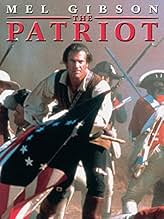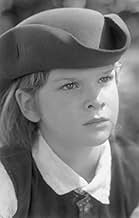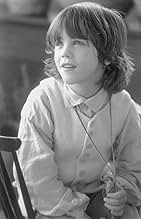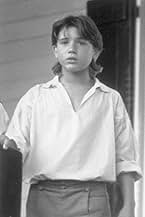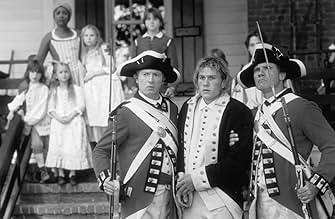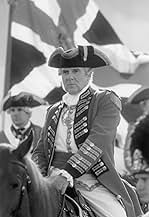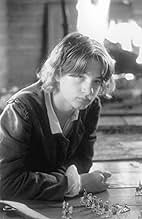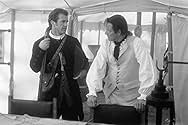Il pacifico agricoltore Benjamin Martin diventa capo di una milizia coloniale durante la rivoluzione americana quando un sadico ufficiale britannico uccide suo figlio.Il pacifico agricoltore Benjamin Martin diventa capo di una milizia coloniale durante la rivoluzione americana quando un sadico ufficiale britannico uccide suo figlio.Il pacifico agricoltore Benjamin Martin diventa capo di una milizia coloniale durante la rivoluzione americana quando un sadico ufficiale britannico uccide suo figlio.
- Regia
- Sceneggiatura
- Star
- Candidato a 3 Oscar
- 9 vittorie e 23 candidature totali
Recensioni in evidenza
Spectacular and breathtaking film about the American Independence War dealing with an enjoyable family and the tragic events happening along the way . Benjamin Martin : Mel Gibson is a conscientious objector due to previous wars he suffered and he is nowadays a widower of seven children : Heath Ledger , Logan Lerman , Gregory Smith, Mika Boorem, Sky Bartusiak , Trevor Morgan ... He is a former guerrilla soldier who just wants to raise his family in peace . Unfortunately , local Redcoats as Col. Tavington : Jason Isaacs , underlings : Adam Baldwin , and commander-in-chief : Tom Wilkinson have other ideas . When Martin's idealistic soldier son Gabriel : Aussie Ledger is captured , daddy gets caught in action . What would you do if they destroyed your home , threatened your family . Where would you draw the line ? Before they were soldiers , they were family . Before they were legends , they were heroes . Before there was a nation , there was a fight for freedom . Some things are worth fighting for .
Revolutionary War vengeance pic with thrills , noisy action , overwhelming fights and well-played . The main character and central axis of the movie results to be Benjamin Martin/Mel Gibson, magnificently performed , as a bloodied veteran of the French and Indian Wars , and a few years later a pacifist , but his pacifism owes as much to pragmatism as conviction to defend and care his several children . A violently idealist movie dealing with historical events about the Independence War , battles between Colonians and British army . Alongside the great Mel Gibson appears the early deceased Heath Ledger and a large cast of secondaries giving sensational performances , such as : Chris Cooper , Tom Wilkinson, Joely Richardson , Tcheky Karyo , Donald Logue , Adam Baldwin, Leon Rippy , Rene Auberjonois and special mention for Jason Issacs providing a really baddie role as sadistic colonel.
Adding a rousing and attractive musical score from maestro John Williams, Steven Spielberg's regular. As well as colorful and brilliant cinematography from Caleb Deschanel. This overlong , bloody and melodramatic motion picture was compellingly produced -along with Dean Devlin- and directed by Roland Emmerich (The Day after tomorrow , Godzilla , Independence Day , Stargate , Universal Soldier , Moon 44 , Ghost Chase, Joey) . Rating : 7.5/10. Better than average . The flick will appeal to Mel Gibson fans . Worthwhile watching .
Revolutionary War vengeance pic with thrills , noisy action , overwhelming fights and well-played . The main character and central axis of the movie results to be Benjamin Martin/Mel Gibson, magnificently performed , as a bloodied veteran of the French and Indian Wars , and a few years later a pacifist , but his pacifism owes as much to pragmatism as conviction to defend and care his several children . A violently idealist movie dealing with historical events about the Independence War , battles between Colonians and British army . Alongside the great Mel Gibson appears the early deceased Heath Ledger and a large cast of secondaries giving sensational performances , such as : Chris Cooper , Tom Wilkinson, Joely Richardson , Tcheky Karyo , Donald Logue , Adam Baldwin, Leon Rippy , Rene Auberjonois and special mention for Jason Issacs providing a really baddie role as sadistic colonel.
Adding a rousing and attractive musical score from maestro John Williams, Steven Spielberg's regular. As well as colorful and brilliant cinematography from Caleb Deschanel. This overlong , bloody and melodramatic motion picture was compellingly produced -along with Dean Devlin- and directed by Roland Emmerich (The Day after tomorrow , Godzilla , Independence Day , Stargate , Universal Soldier , Moon 44 , Ghost Chase, Joey) . Rating : 7.5/10. Better than average . The flick will appeal to Mel Gibson fans . Worthwhile watching .
Just watched this movie for about the 20th time (I have it on TiVo) and for the life of me I cannot find the disdain many who have written here have commented on. Last I heard, this was FICTION - NOT a documentary; Ken Burns did not produce not write nor direct nor narrate this piece - Roland Emmerich, a man known for action FICTION did. Yes the depiction of the Revolutionary War was NOT 100% accurate but was never intended to be; just a drama set against the background of a war and it was refreshing to see the war in the background, whereupon American blood is spilled on American soil, was the Revolutionary War and not another Civil War piece; indeed, the Civil War has been played so many times in films over the past quarter century it was just refreshing to see a different war....
Being somewhat of a military historian I will say that the depiction of soldiers going musket to musket in the open field was indeed accurate; many may find it interesting to know that according to the gentlemanly practices of King George's army, both sides would also recess for tea at noon every day and resume the fighting afterwards - guerrilla warfare was not popular during the day which is why Gibson's militia unit was so overtly successful early on. That being said, the comments about the accuracy with the muskets are fairly accurate but I will say that I only see straight barrel musket rifles - none of the bell shape tipped muskets; the longer you keep a projectile on a straight course the more accuracy at longer ranges despite the lack of rifling grooves in the barrels (I spent time on Rifle Teams for 5 years). The prime inaccuracy I noted was when Tavington shot the rider (running away on horseback) in the back with a musket pistol at probably 40 yards or more - so unlikely, it tarnished the whole scene.
My favorite person - Billings; Leon Rippey's cynical, almost giggly snickering laugh completely stole the every scene where it was used and he is a long term favorite actor of mine; Jason Isaacs absolutely best screen villain of this movie (and perhaps in top 10 screen villains of all time).
I guess it boils down to "different strokes for different folks" we all have our opinions on this and I've aired mine.
Being somewhat of a military historian I will say that the depiction of soldiers going musket to musket in the open field was indeed accurate; many may find it interesting to know that according to the gentlemanly practices of King George's army, both sides would also recess for tea at noon every day and resume the fighting afterwards - guerrilla warfare was not popular during the day which is why Gibson's militia unit was so overtly successful early on. That being said, the comments about the accuracy with the muskets are fairly accurate but I will say that I only see straight barrel musket rifles - none of the bell shape tipped muskets; the longer you keep a projectile on a straight course the more accuracy at longer ranges despite the lack of rifling grooves in the barrels (I spent time on Rifle Teams for 5 years). The prime inaccuracy I noted was when Tavington shot the rider (running away on horseback) in the back with a musket pistol at probably 40 yards or more - so unlikely, it tarnished the whole scene.
My favorite person - Billings; Leon Rippey's cynical, almost giggly snickering laugh completely stole the every scene where it was used and he is a long term favorite actor of mine; Jason Isaacs absolutely best screen villain of this movie (and perhaps in top 10 screen villains of all time).
I guess it boils down to "different strokes for different folks" we all have our opinions on this and I've aired mine.
I'm very surprised at the lower ratings here. This is a successful example of a movie which balances having fictional characters/situations take place in a historical setting while still maintaining some accuracy. Aside from that, the acting is solid and the effects and quality for a movie made in 2000 are top notch.
The Patriot is NOT a documentary. It didn't pretend to be, and wasn't. Loosely based upon Francis Marion (the "Swamp Fox"), it only touched on Marion's impact on the Revolution in South Carolina. If anything, it was downplayed. For instance, in real life, he had over 150 men in his guerrilla band. The movie portrayed him as having far fewer. As a documentary, it fails on this and many other points. As a movie, it is a tremendous success.
As far as visuals, they were stunning. The wide-open vistas and battle scenes were breath-taking and beautifully filmed. Yes, it was violent, but that lent a realism to the film that most other films about this era lack. The look and feel of this period was portrayed well.
The acting was superb. I won't give anything away, but this did NOT (arguably) have either an entirely "Hollywood" plot – people, including civilians, DIE, as they do in war – or much of a "Hollywood" ending, despite a relatively happy one. That was impressive, and made the film genuine, exciting and at times, shocking. Plot points such as Benjamin Martin's youngest daughter's feelings about her daddy, and the romance between his son and a young girl were touching, and even emotional.
I found some things complain about. Crisp, clean, brand-new Colonial American flags suddenly appear after, and during, the final battle. In reality they would have been rags by then – or at least not so clean. One bad bit of dialogue: Benjamin Martin is on the beach with his sister-in- law, and he asks if he can sit down. Her reply, "It's a free country – or will be soon," was a 20th century throw-away line dressed up with a 1780 caveat, and I cringed at it.
The film was historically accurate in many respects. The formal way of speaking, plus the family-above-all, loyalty-to-The-Cause attitudes expressed throughout, were genuine, even though both are out of favor today. Children using weapons, and going off to fight on a moment's notice, was not an uncommon story, and supposedly happened in a branch of my own family. Relationships like Martin's and his wife's sister did occur, often out of necessity. I was surprised to read afterwards that the battle tactics of the last scene occurred, almost exactly as shown, at the Battle of Cowpens, including fierce hand-to-hand combat. Colonel Banastre Tarleton – the basis for the movie's character William Tavington – was indeed seen as a war criminal by American colonists at the time, and the real Tarleton even had a horse shot out from under him!
But was it biased? Sure it was. Roughly a third of the American colonists were Loyalists, another third were "rebels", and another third were undecided. It would have made the story more complete and complex to portray this (or the time Tarleton mistakenly slaughtered some of those very Loyalists!) But I've read a poem online ("Ode to Valour") dedicated to Col. Banastre Tarleton's "heroic exploits" that would shame modern-day propagandists.
I think we all accept that not every British officer of this era was a monster. In fact, in the movie – as in real life - Cornwallis and other British officers were appalled that the "Ghost"/Swamp Fox did not play by the rules of "civilized warfare", and chastised characters like Tavington who also breached them. The real Swamp Fox knew a bit about balance, however. After after the war, when the real Francis Marion served in the South Carolina Senate, he is said to have advocated a lenient policy toward the Loyalists. The real Tarleton survived the war, went home to write his memoirs, was seen as a hero, and was elected to Parliament. Maybe we need a sequel to cover all of these other aspects of the story. Until then, this one is a must- see.
As far as visuals, they were stunning. The wide-open vistas and battle scenes were breath-taking and beautifully filmed. Yes, it was violent, but that lent a realism to the film that most other films about this era lack. The look and feel of this period was portrayed well.
The acting was superb. I won't give anything away, but this did NOT (arguably) have either an entirely "Hollywood" plot – people, including civilians, DIE, as they do in war – or much of a "Hollywood" ending, despite a relatively happy one. That was impressive, and made the film genuine, exciting and at times, shocking. Plot points such as Benjamin Martin's youngest daughter's feelings about her daddy, and the romance between his son and a young girl were touching, and even emotional.
I found some things complain about. Crisp, clean, brand-new Colonial American flags suddenly appear after, and during, the final battle. In reality they would have been rags by then – or at least not so clean. One bad bit of dialogue: Benjamin Martin is on the beach with his sister-in- law, and he asks if he can sit down. Her reply, "It's a free country – or will be soon," was a 20th century throw-away line dressed up with a 1780 caveat, and I cringed at it.
The film was historically accurate in many respects. The formal way of speaking, plus the family-above-all, loyalty-to-The-Cause attitudes expressed throughout, were genuine, even though both are out of favor today. Children using weapons, and going off to fight on a moment's notice, was not an uncommon story, and supposedly happened in a branch of my own family. Relationships like Martin's and his wife's sister did occur, often out of necessity. I was surprised to read afterwards that the battle tactics of the last scene occurred, almost exactly as shown, at the Battle of Cowpens, including fierce hand-to-hand combat. Colonel Banastre Tarleton – the basis for the movie's character William Tavington – was indeed seen as a war criminal by American colonists at the time, and the real Tarleton even had a horse shot out from under him!
But was it biased? Sure it was. Roughly a third of the American colonists were Loyalists, another third were "rebels", and another third were undecided. It would have made the story more complete and complex to portray this (or the time Tarleton mistakenly slaughtered some of those very Loyalists!) But I've read a poem online ("Ode to Valour") dedicated to Col. Banastre Tarleton's "heroic exploits" that would shame modern-day propagandists.
I think we all accept that not every British officer of this era was a monster. In fact, in the movie – as in real life - Cornwallis and other British officers were appalled that the "Ghost"/Swamp Fox did not play by the rules of "civilized warfare", and chastised characters like Tavington who also breached them. The real Swamp Fox knew a bit about balance, however. After after the war, when the real Francis Marion served in the South Carolina Senate, he is said to have advocated a lenient policy toward the Loyalists. The real Tarleton survived the war, went home to write his memoirs, was seen as a hero, and was elected to Parliament. Maybe we need a sequel to cover all of these other aspects of the story. Until then, this one is a must- see.
Until the early 2000s, Mel Gibson's name was on the rise and synonymous with the box office. A fact driven by several successes with the public and even critics, such as "Braveheart", which earned him several awards, including the main one from the Academy at that time. Well, this title directed by Roland Emmerich directly evokes Gibson's feature, only changing the dominated people, from the Scottish to the American.
"The Patriot" takes place in 1776 and we begin to follow the story of Benjamin Martin (Mel Gibson), a war veteran, a widower, who fought against France and against the natives of the land, and understands the horrors of a battle. Traumatized, Martin seems to raise his family within universal anti-war values. With a gigantic family to raise, and young children to look after, Benjamin opposes the opening of an armed conflict with the British, for the independence of the nation, precisely to avoid yet another tragedy. And the character's motives are absolutely believable. However, the figure of his eldest son, Gabriel (Heath Ledger), appears as an obstacle to a more peaceful life. Gabriel Martin is a patriot and wants to fight for the nation, going against his father's wishes. And he will. It turns out that in the middle of the conflict he needs to return, injured. On this return, the British surround the city where Benjamin and his family live, and it is there that the British commit barbarities against his family, even killing one of his children. From there, driven by the feeling of revenge, Benjamin abandons pacifism and joins Gabriel in an attempt to build an army strong enough to destroy the British presence in the colony.
As a war film, The Patriot brings an important difference: unlike works such as Saving Private Ryan, Platoon or The Cannons of Navarone, which narrate battles that took place in lands far from the residences of their protagonists, this film shows a bloody dispute that , as Gibson's character observes right at the beginning of the narrative, was fought in the backyards of the Americans themselves - something that allowed their enemies to attack their opponents' families in order to lower their morale (it is curious to see the Yankees suffering the same types of abuses that would come to inflict on the Vietnamese about two hundred years later). The scene in which one of the rebels discovers his wife and child dead, for example, is dramatic and shocking, causing a strong impact on the viewer.
Incidentally, The Patriot is full of scenes like this - and there is nothing sadder than seeing a father handing guns to his children, still children, after instructing them to shoot at the enemy. Unfortunately, this is the reality of war, the most stupid and irrational way to resolve a basically commercial issue (in the end, it's always the money that counts). In any case, Roland Emmerich makes a beautiful historical reconstruction, being well advised by the excellent costumes of Deborah Lynn Scott (already a strong contender for the Oscar) and by the realistic art direction of Barry Chusid. The battle scenes are also strong and intense and - although they pale in comparison to the sequences of "Saving Private Ryan" - they end up shocking the viewer by their brutality.
The film demonstrates what happened in the first act, with the death of the youngest son of Mel Gibson's character. Which is shocking for its realism and its meanness to a child. What follows next is already known. The direction does not abuse violence, but uses strategic moments to use it, as in the great war scenes, in which the characters' heads and legs are cut off, but with some caution so that it does not become just blood and carnage. Brutal in the right measure, the film feeds, for two and a half hours, a powerful climax, which is the moment when Benjamin comes face to face with his son's tormentor, Colonel William Tavington (Jason Isaacs). By the way, Jason Isaacs is insufferable in this film, a worthy executioner.
The script, written by the same Robert Rodat of "Saving Private Ryan", is interesting and well structured, in addition to offering several moments that clearly work as comic relief - something practically non-existent in Spielberg's masterpiece. With that, Emmerich creates a film that, despite being "easier" to watch, causes less impact and has its drama diluted by the jokes. A good example resides in the scene in which Martin negotiates a prisoner exchange with General Cornwallis: amusing, the sequence makes the public relax momentarily. On the other hand, the naivety attributed to Cornwallis makes us take him less seriously, reducing the threat posed by his impeccable war strategies (besides, it's hard to believe that an experienced military man like him would accept Martin's conditions without even sending a messenger to ascertain the conditions of the officer's held hostage by the rebels). Another negative aspect of The Patriot can be found in director Roland Emmerich's constant attempts to manipulate the viewer's emotions in a Manichaean and unjustified way (proof of his lack of skill in the dramatic field): the sequence in which young Anne makes a passionate speech (but contrived) in a Church becomes embarrassing, clearly bearing the label of a "Hollywood moment": the music rises, the characters stand up one by one and everyone looks at each other with emotion. The result is ineffective and falsely ringing.
However, the big problem with Rodat's script is the villain played by Jason Isaacs, a certain Captain William Tavington: stereotyped and poorly constructed, the character is the personification of the "British evil" portrayed by Emmerich. Sadistic and arrogant, he takes pleasure in coldly killing his opponents and their families. To top it off, he ends up taking on some typical characteristics of Hollywood bandits, including indestructibility - only the hero will have the power to defeat him, of course. Unfortunately, by summarizing the American Revolution to the figure of a villain, the script loses its main focus: instead of following the development of a war for the independence of a nation, we are led to summarize our expectations of the dispute between two men, who end up personifying the "good" and "bad" sides of the dispute. Thus, when the two finally confront each other, The Patriot loses momentum and concludes with a rushed narrative about the outcome of the war.
Another curious aspect of Robert Rodat's screenplay is the neglect of the issue of slavery: the fact is that several important members of the American Revolution (including the man on whom Gibson's character was based) owned slaves, something that was completely ignored by the film (the only slave in the story serves only as an excuse for Emmerich to show how his militia colleagues come to respect his bravery). It would have been much more interesting if O Patriota addressed this curious paradox: the same men who fought for the nation's freedom denied this right to their slaves. Certainly, the film would only benefit from this new approach, which could perfectly replace any scene related to the love affair between Gabriel and Anne (Lisa Brenner) or Benjamin and Charlotte (Joely Richardson).
Despite everything, this new work by Roland Emmerich is quite effective, even if it forces us to swallow the exaggerated American patriotism (but what could we expect with this title?). In any case, I regret to see that the film could have taken even more ambitious flights, being able to repeat the feat of works like "Glory" and "Platoon", which definitely serve as excellent studies on the insanity of war and on the very attraction that Americans feel for everything involving gunfire and battlefields. If the plot is not innovative, it is very well filmed. Directed by Roland Emmerich (Godzilla and Independence Day), with photography by Caleb Deschanel (Anna and the King) and soundtrack by master John Williams (Star Wars, Superman, Indiana Jones).
The war scenes, despite the flying legs and heads, can't match the opening half hour of Private Ryan, both by the same screenwriter, Robert Rodat, and the hand-to-hand battles aren't as good as those that Ridley Scott either. Filmed with Russell Crowe in The Gladiator, but the film manages to excite, despite the excess of patriotism, as the title itself already shows. Mel Gibson's performance undeniably guarantees the film's heroic vibe, acting now with gallantry, now with violence. "The Patriot" is yet another epic that reaffirms all of its genre characteristics applied to Hollywood's vision of the history of conflict between nations, but which, on the other hand, delivers everything a war film needs.
"The Patriot" takes place in 1776 and we begin to follow the story of Benjamin Martin (Mel Gibson), a war veteran, a widower, who fought against France and against the natives of the land, and understands the horrors of a battle. Traumatized, Martin seems to raise his family within universal anti-war values. With a gigantic family to raise, and young children to look after, Benjamin opposes the opening of an armed conflict with the British, for the independence of the nation, precisely to avoid yet another tragedy. And the character's motives are absolutely believable. However, the figure of his eldest son, Gabriel (Heath Ledger), appears as an obstacle to a more peaceful life. Gabriel Martin is a patriot and wants to fight for the nation, going against his father's wishes. And he will. It turns out that in the middle of the conflict he needs to return, injured. On this return, the British surround the city where Benjamin and his family live, and it is there that the British commit barbarities against his family, even killing one of his children. From there, driven by the feeling of revenge, Benjamin abandons pacifism and joins Gabriel in an attempt to build an army strong enough to destroy the British presence in the colony.
As a war film, The Patriot brings an important difference: unlike works such as Saving Private Ryan, Platoon or The Cannons of Navarone, which narrate battles that took place in lands far from the residences of their protagonists, this film shows a bloody dispute that , as Gibson's character observes right at the beginning of the narrative, was fought in the backyards of the Americans themselves - something that allowed their enemies to attack their opponents' families in order to lower their morale (it is curious to see the Yankees suffering the same types of abuses that would come to inflict on the Vietnamese about two hundred years later). The scene in which one of the rebels discovers his wife and child dead, for example, is dramatic and shocking, causing a strong impact on the viewer.
Incidentally, The Patriot is full of scenes like this - and there is nothing sadder than seeing a father handing guns to his children, still children, after instructing them to shoot at the enemy. Unfortunately, this is the reality of war, the most stupid and irrational way to resolve a basically commercial issue (in the end, it's always the money that counts). In any case, Roland Emmerich makes a beautiful historical reconstruction, being well advised by the excellent costumes of Deborah Lynn Scott (already a strong contender for the Oscar) and by the realistic art direction of Barry Chusid. The battle scenes are also strong and intense and - although they pale in comparison to the sequences of "Saving Private Ryan" - they end up shocking the viewer by their brutality.
The film demonstrates what happened in the first act, with the death of the youngest son of Mel Gibson's character. Which is shocking for its realism and its meanness to a child. What follows next is already known. The direction does not abuse violence, but uses strategic moments to use it, as in the great war scenes, in which the characters' heads and legs are cut off, but with some caution so that it does not become just blood and carnage. Brutal in the right measure, the film feeds, for two and a half hours, a powerful climax, which is the moment when Benjamin comes face to face with his son's tormentor, Colonel William Tavington (Jason Isaacs). By the way, Jason Isaacs is insufferable in this film, a worthy executioner.
The script, written by the same Robert Rodat of "Saving Private Ryan", is interesting and well structured, in addition to offering several moments that clearly work as comic relief - something practically non-existent in Spielberg's masterpiece. With that, Emmerich creates a film that, despite being "easier" to watch, causes less impact and has its drama diluted by the jokes. A good example resides in the scene in which Martin negotiates a prisoner exchange with General Cornwallis: amusing, the sequence makes the public relax momentarily. On the other hand, the naivety attributed to Cornwallis makes us take him less seriously, reducing the threat posed by his impeccable war strategies (besides, it's hard to believe that an experienced military man like him would accept Martin's conditions without even sending a messenger to ascertain the conditions of the officer's held hostage by the rebels). Another negative aspect of The Patriot can be found in director Roland Emmerich's constant attempts to manipulate the viewer's emotions in a Manichaean and unjustified way (proof of his lack of skill in the dramatic field): the sequence in which young Anne makes a passionate speech (but contrived) in a Church becomes embarrassing, clearly bearing the label of a "Hollywood moment": the music rises, the characters stand up one by one and everyone looks at each other with emotion. The result is ineffective and falsely ringing.
However, the big problem with Rodat's script is the villain played by Jason Isaacs, a certain Captain William Tavington: stereotyped and poorly constructed, the character is the personification of the "British evil" portrayed by Emmerich. Sadistic and arrogant, he takes pleasure in coldly killing his opponents and their families. To top it off, he ends up taking on some typical characteristics of Hollywood bandits, including indestructibility - only the hero will have the power to defeat him, of course. Unfortunately, by summarizing the American Revolution to the figure of a villain, the script loses its main focus: instead of following the development of a war for the independence of a nation, we are led to summarize our expectations of the dispute between two men, who end up personifying the "good" and "bad" sides of the dispute. Thus, when the two finally confront each other, The Patriot loses momentum and concludes with a rushed narrative about the outcome of the war.
Another curious aspect of Robert Rodat's screenplay is the neglect of the issue of slavery: the fact is that several important members of the American Revolution (including the man on whom Gibson's character was based) owned slaves, something that was completely ignored by the film (the only slave in the story serves only as an excuse for Emmerich to show how his militia colleagues come to respect his bravery). It would have been much more interesting if O Patriota addressed this curious paradox: the same men who fought for the nation's freedom denied this right to their slaves. Certainly, the film would only benefit from this new approach, which could perfectly replace any scene related to the love affair between Gabriel and Anne (Lisa Brenner) or Benjamin and Charlotte (Joely Richardson).
Despite everything, this new work by Roland Emmerich is quite effective, even if it forces us to swallow the exaggerated American patriotism (but what could we expect with this title?). In any case, I regret to see that the film could have taken even more ambitious flights, being able to repeat the feat of works like "Glory" and "Platoon", which definitely serve as excellent studies on the insanity of war and on the very attraction that Americans feel for everything involving gunfire and battlefields. If the plot is not innovative, it is very well filmed. Directed by Roland Emmerich (Godzilla and Independence Day), with photography by Caleb Deschanel (Anna and the King) and soundtrack by master John Williams (Star Wars, Superman, Indiana Jones).
The war scenes, despite the flying legs and heads, can't match the opening half hour of Private Ryan, both by the same screenwriter, Robert Rodat, and the hand-to-hand battles aren't as good as those that Ridley Scott either. Filmed with Russell Crowe in The Gladiator, but the film manages to excite, despite the excess of patriotism, as the title itself already shows. Mel Gibson's performance undeniably guarantees the film's heroic vibe, acting now with gallantry, now with violence. "The Patriot" is yet another epic that reaffirms all of its genre characteristics applied to Hollywood's vision of the history of conflict between nations, but which, on the other hand, delivers everything a war film needs.
Lo sapevi?
- QuizHeath Ledger didn't work for a year because he only got offers for teen heartthrob roles. He was about to quit acting, and return to Australia, when he was cast in the film.
- BlooperGeorge Washington's proclamation regarding the freeing of slaves who give one year of service is incorrectly interpreted. The historical offer applied to slaves who enlisted in the Continental regulars or served in regular state forces which served with Continental armies. It did not apply to units such as Benjamin Martin's local militia, which solely were under state control.
- Citazioni
Colonel William Tavington: Kill me before the war is over, will you? It appears that you are not the better man.
Benjamin Martin: You're right. My sons were better men.
- Versioni alternativeIn the extended edition, Benjamin Martin's youngest children get their first taste of the horrors of war prior to Thomas's death. This comes just before the evening when Gabriel stumbles home after being wounded in a nearby battle. Something (the viewer is unaware) catches the attention of the Martin children and they stride over to a nearby creek/river to investigate. What they discover are the bodies of several soldiers floating downstream. Martin then comes over and ushers the children back into the house.
- Colonne sonoreBoney
Traditional
Performed by Marquetta L. Goodwine and the Gullah Cunneckshun
I più visti
Accedi per valutare e creare un elenco di titoli salvati per ottenere consigli personalizzati
Dettagli
- Data di uscita
- Paesi di origine
- Siti ufficiali
- Lingue
- Celebre anche come
- El patriota
- Luoghi delle riprese
- Rock Hill, South Carolina, Stati Uniti(Revolutionary War Re-enactment battles)
- Aziende produttrici
- Vedi altri crediti dell’azienda su IMDbPro
Botteghino
- Budget
- 110.000.000 USD (previsto)
- Lordo Stati Uniti e Canada
- 113.330.342 USD
- Fine settimana di apertura Stati Uniti e Canada
- 22.413.710 USD
- 2 lug 2000
- Lordo in tutto il mondo
- 215.294.342 USD
- Tempo di esecuzione
- 2h 45min(165 min)
- Colore
- Mix di suoni
- Proporzioni
- 2.39 : 1
Contribuisci a questa pagina
Suggerisci una modifica o aggiungi i contenuti mancanti




